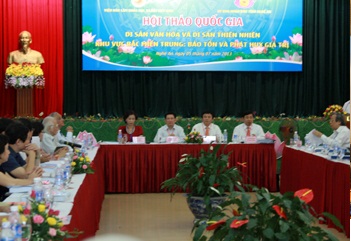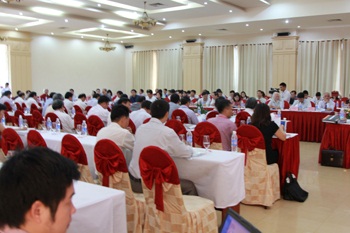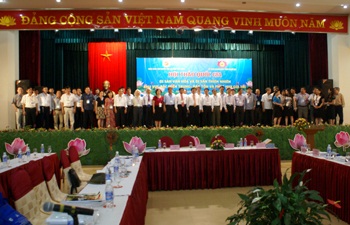On July 5th, 2013, in Vinh city of Nghe An province, Vietnam Academy of Social Sciences (VASS) in collaboration with Nghe An People’s Committee held a national conference on “Cultural and Natural Heritage in the North-Central Region: Preservation and Promotion.”
 |
Attending the workshop were Prof.Dr. Nguyen Xuan Thang, Member of the Party Central Committee, President of VASS; Dr. Dang Thi Bich Lien, Deputy Minister of Culture, Sport and Tourism; Dr. Ho Duc Phuoc, Nghe An Provincial Party Committee Secretary; Dr. Nguyen Xuan Duong, Chairman of Nghe An People’s Committee; Assoc.Prof.Dr. Tran Duc Cuong, Deputy Chairman of the Scientific Committee of VASS; Prof.Dr.Sc. Luu Tran Tieu, Chairman of the National Cultural Heritage Committee; and 140 other participants from VASS, Ministry of Culture, Sports and Tourism, the Council of National Cultural Heritage, Vietnam Institute of Arts and Culture in Hue, Hue University of Sciences, Vinh University, Hong Bang University and various departments of the six provinces of the North-Central Region.
The provinces of the North-Central Region have many similarities in culture, history, and social, economic and natural conditions. These provinces have a rich and diverse natural and cultural heritage, with four heritage sites already recognized by UNESCO as World Heritage: the Complex of Hue Monuments, Hue’s Nha Nhac (royal music), Phong Nha-Ke Bang National Park, and Ho Dynasty Citadel. In addition, and many other heritage sites have been recognized as Special National Heritage, for example: Nguyen Du Commemorative Area, Lam Kinh Relic of Architecture and History, etc.
In his opening remarks, Prof.Dr. Nguyen Xuan Thang, President of VASS said that the conference aimed to explore, assess and affirm the situation of natural and cultural heritage in the North-Central Region, and then propose solutions for preserving, restoring and promoting natural and cultural heritage in the North-Central Region to related local and national agencies. A related aim would be to provide foundations for building linkages/connections among provinces both within and outside the region in order to further develop historical and cultural tourism, landscape tourism and resort tourism, and to promote the Vietnamese country and people with images of cultural and natural heritage in the North-Central Region. These are necessary tasks that could help to build up an advanced Vietnamese culture deeply imbued with national identity, and contribute to the overall development of our country’s economy, culture, and society. Although its preparation time was short, the conference has attracted special attention from scientists, managers, and policy makers; over 60 papers have been submitted to the conference organizers.
 |
On behalf of Nghe An provincial leaders, Dr. Nguyen Xuan Duong, Chairman of the People’s Committee of Nghe An, said that the North-Central region was “a sacred land with extraordinary people”, which had a long cultural history and was home to a great deal of tangible and intangible cultural heritage, representing our people’s struggles to found and defend our nation. In recent years, the provinces of the North-Central Region have advocated dynamic policies for preserving and promoting natural and cultural heritage. As a result, the region has had many cultural heritage sites recognized by UNESCO as world cultural heritage.
Assoc.Prof.Dr. Tran Duc Cuong, Deputy Chairman of the Scientific Committee of VASS, in his keynote address, asserted that the North-Central Region was rich not only in cultural heritage but also in natural heritage. It is a land of varied landscapes including mountains, midlands, plains and coastal areas. Recently, recognizing the advantage of cultural heritage and natural heritage in the process of development, many local agencies have made great efforts and employed explicit strategies to preserve and promote the values of heritage which helps build a rich, beautiful homeland and improve people’s physical and spiritual life.
In his paper entitled “Preserving and Promoting Relics and Tourist Attractions in Nghe An”, Dr. Ho Duc Phuoc, Provincial Party Committee Secretary of Nghe An stated that Nghe An culture had a long history of sustainable development and a unique identity which could not be mixed up with other cultures. Dr. Phuoc also outlined some of the situations and solutions for managing, preserving, and promoting the value of relics and tourist attractions in Nghe An.
The conference was divided into two sessions, in addition to the opening and closing ceremonies: 1) Preserving and Promoting the Value of Natural Heritage, and 2) Preserving and Promoting the Value of Cultural Heritage. The conference’s papers focused on the following themes:
1. The situation of cultural and natural heritage in the North-Central Region: similarities and differences.
2. The preservation of local heritage in the North-Central Region.
3. The cultural and economic values of heritage in the North-Central Region, and the promotion of values to serve the cause of national development and improve the people’s lives.
4. Folk festivals, customs, traditional performances, food and family culture in the North-Central Region: values and promotion strategies.
5. The preservation, restoration, and promotion of cultural and historical relics in the North-Central Region.
6. Collaborations between local people in promoting the cultural and natural heritage of the North-Central Region.
In his conference summation statement, Assoc.Prof.Dr. Tran Duc Cuong stressed that the comments and suggestions made at the conference highlighted the diversity and uniqueness of the North-Central ecosystem, the cultural values of the North Central Region such as family culture (with its traditional fondness for learning and competitive examinations, and its success over the centuries in examinations), hò sông Mã music, ví dặm singing, boatwomen’s songs, Hue’s nhã nhạc (royal music), and folk festivals. By examining the situations of natural and cultural heritage, the conference papers provided insight into the role of heritage preservation, restoration and promotion in the construction and development process of our country today. One of the most urgent tasks, Assoc.Prof. Cuong said, was to improve preservation activities and further promote the values of natural and cultural heritage by following heritage law, harmonizing the requirements of preservation and development, mobilizing local people for preservation work following the principle of ensuring legitimate benefits for local people and thus encouraging them to participate in this work, equipping local people and others involved in preservation work with basic preservation knowledge, and regularly monitoring preservation work as it proceeds. In conservation work, it is necessary to balance the promotion of natural and cultural values with economic benefits, using those values to serve and improve the spiritual and material life of local people and introducing Vietnamese culture and people to friends around the world; however, these goals should not be pursued at all costs but should ensure the long-term conservation of the country’s heritage for present and future generations. An important topic raised by researchers and managers at the conference was the role of regional affiliations in preserving and promoting the North-Central Region’s heritage values. Assoc.Prof. Cuong also pointed out the requirements and challenges of these issues and the need to resolve them through close co-ordination among local people, researchers, managers and policymakers
 |
On behalf of the conference’s organizers, Prof.Dr. Nguyen Xuan Thang thanked all participants, including researchers, managers and policy makers. Prof. Thang asserted that the participants’ interest and contributions strongly affirmed the conference topic’s relevance and judiciousness. Prof. Thang added that it was a broad topic which should be further discussed in separate and in-depth meetings thereby creating truly regional affiliations. VASS’s President stressed that despite the successes, the six provinces of the North-Central Region still had more work to do, and should pay more attention to the role of state management in building appropriate policies and solutions. Prof. Thang also emphasized the need for cooperation between provinces and regions – not only within the North-Central Region but also in the North, Central, and South regions of Vietnam, the Southeast Asian region, and the Greater Mekong sub-region. Prof. Thang said that following the conference, the organizers should write specific recommendations on stage management, community strengthening, and the role of enterprises in preserving and promoting heritage values, with emphasis on the importance of the training and re-training of human resources.
Conference participants also visited Pu Mat National Park in Con Cuong district, Nghe An province as part of the conference proceedings.
Nguyen Thu Ha







